All plants need water to survive, but some can also do well without frequent irrigation! Here are some of the Best Drought Tolerant Plants!
Planting drought-tolerant plants is an excellent idea if you live in an area with unfavorable weather and water scarcity. They become less thirsty, stay resilient, and can survive in dry soil. If you like the idea, here are some of the Best Drought Tolerant Plants you can easily grow!
Here are Really Beautiful Drought Tolerant Houseplants
Best Drought Tolerant Plants
By “Drought Tolerant,” we mean these plants may not require as frequent watering as the other ones. However, you will have to eventually water them once in 4-7 days, depending on the climate.
1. Agave
Botanical Name: Agave
USDA Zones: 5-11
Agaves store water in their thick foliage, and this makes them live without it for long. Landscapers often grow them due to the low maintenance nature and unusual shape of their foliage too!
Here are some of the best agave varieties you can grow
2. Lithops
Botanical Name: Lithops
USDA Zones: 9-12
Lithops are unique, stone-like succulent plants with a low-watering requirement. This attribute makes them one of the best plants to grow in small succulent displays.
Check out our article on growing lithops here
3. Sedum
Botanical Name: Sedum
USDA Zones: 7-11
Known for its resistance to drought and low maintenance nature, whole sedum genus plants grow in all soil types and prefer plenty of light.
Here are some of the best sedum varieties you can grow
4. Desert Rose
Botanical Name: Adenium obesum
USDA Zones: 9-12
Also known as “Desert Rose,” Adenium is a tropical succulent that requires occasional watering. It does well in full sun and can also be grown as a houseplant in colder climates.
Check out our article on desert rose care here
5. Jade Plant

Botanical Name: Crassula ovata
USDA Zones: 9-12
Featuring fleshy paddle-shaped leaves, jade is a popular succulent. It is also believed to bring good luck to the owner.
Check out some amazing jade plant benefits here
6. Cacti
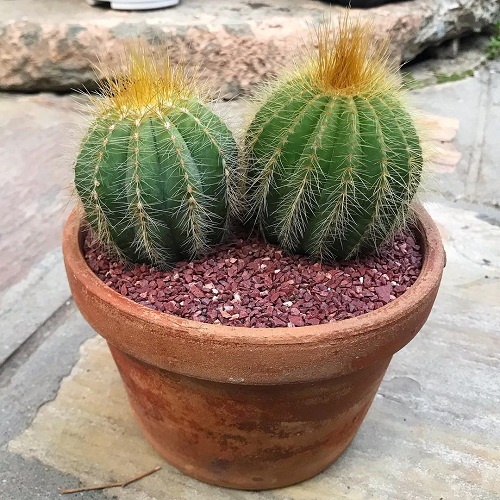
USDA Zones: 6-12
Cacti come in many shapes and sizes and do remarkably well in low water. These are perfect plants for desert conditions, and you can also grow them in pots.
Here are some of the best cacti you can grow
7. Bougainvillea

Botanical Name: Bougainvillea
USDA Zones: 9-11
Bougainvillea is a champion in tolerating drought phases. It’s one of the toughest shrubs that thrive on neglect in extreme and intense conditions.
Check out our article on the best Bougainvillea care tips here
8. Moss Rose

Botanical Name: Portulaca grandiflora
USDA Zones: 3-11
Moss rose is a drought-tolerant flowering plant that thrives in dry, poor soil. Due to its thick succulent leaves, it can survive for a long time without water. It can’t tolerate frost, and you can only grow it as an annual unless you live in warm climates.
Learn about Moss Rose Plant Care here
9. Blanket Flower
Botanical Name: Gaillardia
USDA Zones: 3-10
The blanket flower has no special needs. Anyone without a green thumb can make it bloom prolifically. All it really wants is a sunny spot and occasional watering spells.
10. Verbena
Botanical Name: Verbena officinalis
USDA Zones: 9-11
Verbena is an excellent ground cover that spreads rapidly and thrives in high heat and infrequent little water. It does well in full sun and well-drained soil.
11. Lantana
Botanical Name: Lantana camara
USDA Zones: 9-11
Lantana is a tropical plant grown for its fragrant, colorful flowers. The plant loves heat and drought and is known for its less demanding nature. Because it’s invasive, it’s better to grow it in pots.
Here’s all you need to know about growing lantana
12. Wallflower
Botanical Name: Erysimum
USDA Zones: 6-9
Known for their beautiful colors and sweet fragrance, wallflowers are short-lived perennials and require occasional watering. Flowers appear in spring and summer in clusters.
13. Oleander
Botanical Name: Nerium oleander
USDA Zones: 5-9
Oleander is a tropical shrub that blooms prolifically and is the top one on the list of the best drought tolerant plants for pots. It produces beautiful fragrant flowers of different colors, like yellow, pink, red, white, and purple. All parts of it are toxic!
14. Rock Soapwort
Botanical Name: Saponaria ocymoides
USDA Zones: 3-8
Grow this plant if you’re searching for one that thrives on neglect, requires no fertilizers, and performs well in poor soil and drought-like conditions.
15. Sage
Botanical Name: Salvia officinalis
USDA Zones: 5-10
This drought-resistant herb is famous for its aromatic flavor and is cherished among the best drought tolerant potted plants. Sage has low watering requirements, and overwatering can kill the plant quickly.
Check out our article on growing sage here
16. Poppy
Botanical Name: Papaver
USDA Zones: 3-8
Thanks to the vibrant colors, poppies are the biggest attraction anywhere when in bloom. To grow poppies, all you need is sufficient exposure to the sun and low to moderate watering.
Here’s all the information you need on growing poppies
17. Lavender Cotton
Botanical Name: Santolina chamaecyparissus
USDA Zones: 6-9
This mound-forming shrub has gray-green foliage and pretty button-like flowers that appear in summer. It does well in low water and thrives in full sun.
18. Lavender
Botanical Name: Lavandula
USDA Zones: 5-9
Looking for the best drought tolerant shade plants? This unmistakable flowering herb is easy to grow and is quite drought-tolerant. You can also plant it in the pot to enjoy its refreshing fragrance!
Check out our article on growing lavender here
19. Rock Daisy
Botanical Name: Perityle
USDA Zones: 5-11
It is most suitable for rock gardens. These flowering plants thrive well in neglect and lack of water and are the best drought tolerant plants for planters.
20. Globe Thistle

Botanical Name: Echinops
USDA Zones: 3-9
Once established, globe thistles tolerate drought and are probably one of the easiest perennials you can have in your garden.
21. Rose Campion
Botanical Name: Silene coronaria
USDA Zones: 3-8
Rose Campion is admired for its silvery-green foliage. The plant requires only supplemental watering during prolonged dry periods.
22. Red Valerian
Botanical Name: Centranthus ruber
USDA Zones: 5-8
This drought-tolerant plant has fragrant round clusters of flowers that appear from late spring and complements its fleshy blue-green foliage.
Want to grow Valerian? Click here
23. Crown of Thorns
Botanical Name: Euphorbia milii
USDA Zones: 5-11
Euphorbia milii tolerate the scarcity of water easily and don’t require special attention. It flowers almost year-round in a location that remains dry, warm, and frost-free.
Learn Growing Crown Of Thorns here
24. Russian Sage

Botanical Name: Perovskia atriplicifolia
USDA Zones: 5-9
This tough and drought-resistant shrub is truly an admirable plant, thanks to its silvery foliage and beautiful plumes of lavender color flowers.
25. Yarrow
Botanical Name: Achillea millefolium
USDA Zones: 3-9
Yarrows are low-maintenance plants with decorative foliage. They’re suitable for borders, wildflower meadows, and rock gardens and are the best drought tolerant plants for full sun.
26. Pineleaf Penstemon

Botanical Name: Pineleaf Penstemon
USDA Zones: 4-9
Pineleaf Penstemon is a herbaceous perennial and low-maintenance plant. It blooms wonderful scarlet-red flowers that attract hummingbirds and butterflies alike.
27. Giant Hyssops
Botanical Name: Agastache
USDA Zones: 4-10
Boasting pink, blue, white, or orange flowers, Agastache is a drought-loving plant. It attracts hummingbirds, butterflies, and other pollinators!
28. Beardtongue

Botanical Name: Penstemon
USDA Zones: 3-9
Beardtongue features clusters of tube-shaped flowers on rigid stems. These plants become drought-tolerant after maturity and require watering every couple of weeks.
29. Coneflower

Botanical Name: Echinacea
USDA Zones: 5-10
Coneflowers are quite drought-tolerant, but they need little maintenance from time to time. You can grow them in any soil type with good drainage.
Here are Types of Coneflower Varieties
30. Calfornia Poppy
Botanical Name: Eschscholzia californica
USDA Zones: 7-11
Calfornia Poppy is a fast-growing, drought-tolerant annual that thrives well in full sun and can also handle partial shade. Grow this plant in well-draining, sandy-loamy soil.
Check out Common California Native Plants here
31. Purple Fountain Grass
Botanical Name: Pennisetum setaceum ‘Rubrum’
USDA Zones: 9-11
This is a famous ornamental, clump-forming grass with purple-red narrow leaves. This drought-tolerant specimen can manage for some days without water.
Here are the Best Types of Fountain Grasses for Containers
32. Kangaroo Paw
Botanical Name: Anigozanthos spp.
USDA Zones: 9-12
Native to Australia, it grows in dry, sandy regions and can withstand long dry spells due to the sap conserved in the roots.
33. New Zealand Tea Tree

Botanical Name: Leptospermum scoparium
USDA Zones: 8-10
Also popular as Manuka. This evergreen shrub has fragrant, prickly, small foliage and ornamental pink, white, or red blooms. Once established, they are the best drought tolerant hanging basket plants.
34. Twinberry Honeysuckle
Botanical Name: Lonicera involucrata
USDA Zones: 4-8
This deciduous shrub flowers in orange-red blooms have trichomes (tiny hairs) that catch water and hold onto it, making the plant drought-tolerant.
35. Pride of Madeira
Botanical Name: Echium candicans
USDA Zones: 9-10
This evergreen plant, with stunning blue flowers, has a mounding growth habit. It grows naturally on rocky cliffs and tolerates dry soil very well.
36. Trumpet Vine

Botanical Name: Campsis radicans
USDA Zones: 4-11
This flowering vine is quite drought-tolerant and can be grown in a range of conditions. It grows fast with bright green leaves and ornamental red-orange flowers during summer.
37. Catmint

Botanical Name: Nepeta x faassenii
USDA Zones: Zones 3 to 8
Grow this drought-tolerant plant on borders, rock gardens, and in pots. It produces fragrant blooms that lure bees and butterflies.
38. Artemisia

Botanical Name: Artemisia spp.
USDA Zones: 3-8
Artemisia is admired for pretty, slender, gray to silver foliage on tall arching stems that grow up to 1-5 feet tall and wide. It’s a popular choice for drought-tolerant gardens.
39. Licorice Plant
Botanical Name: Helichrysum petiolare
USDA Zones: 9-11
This tropical perennial is loved by gardeners for its spreading growth pattern and fuzzy, silver leaves. It thrives well in partial shade to full sun.
Note: Keep in mind that it is not edible and not used for making licorice. Also, listed as an invasive plant where it is considered perennial.
Learn about Licorice Plant Care and How to Grow it here
40. Veronica
Botanical Name: Veronica spp.
USDA Zones: 3-9
Also known as speedwell, this drought-resistant plant features purple, white, pink, or blue spikes. It grows up to 1-2 feet tall and grows best in well-draining soil and full sun.
41. Aloe
Botanical Name: Aloe spp.
USDA Zones: 10-12
Aloe species can grow in drought-like conditions easily. The best ones for landscaping are Coral, Tiger, Soap, and Jewel Aloe.
Learn How to Grow Tree Aloe in Pots here
42. Artichoke
Botanical Name: Cynara cardunculus
USDA Zones: 7-11
The beautiful, drought-tolerant ornamental plant also bears edible artichokes from autumn to spring. It is also quite easy to maintain.
Learn about Growing Artichokes in Pots here
43. Palo Verde
Botanical Name: Parkinsonia spp.
USDA Zones: 8-10
Palo Verde is native to semi-deserts of Africa and America and is an excellent drought-tolerant plant. Pruneit to maintain the shape of a canopy whenever necessary.
44. Geraniums
Botanical Name: Pelargonium spp.
USDA Zones: 9-11
Most varieties of Geraniums are tolerant of drought and heat. Once you establish the plant, they thrive well for a long duration without water.
Learn How to Grow Geranium Indoors Year Round here
45. Wild Lilac

Botanical Name: Ceanothus
USDA Zones: 8-11
Wild lilacs are colorful and fragrant shrubs that are evergreen and are considered one of the best drought tolerant flowering plants. You can grow them in the landscape as hedges, ground covers, borders, and more.
Watch a great video that we have made here
46. Rosemary
Botanical Name: Rosmarinus officinalis
USDA Zones: 8-10
A woody perennial herb with needle-like leaves and a pungent fragrance, Rosemary is drought-tolerant due to its ability to store water in its foliage and roots.
Learn about Growing Rosemary From Cuttings here
47. Thyme
Botanical Name: Thymus vulgaris
USDA Zones: 5-9
With tiny, aromatic leaves and delicate flowers, Thyme is a Drought Tolerant Plant that Grows In a Lack of Water thanks to its deep roots and ability to store water in its leaves.
48. Yucca
Botanical Name: Yucca
USDA Zones: 4-9
Known for its striking, sword-shaped leaves and tall spikes of white flowers, Yucca is a drought-tolerant plant that can thrive in hot, dry conditions as it has fleshy leaves that store water.
49. Black-eyed Susan
Botanical Name: Rudbeckia hirta
USDA Zones: 3-9
With bright yellow petals and a distinctive black center, Black-eyed Susans are drought-tolerant wildflowers that can survive in harsh conditions.
50. Butterfly Weed
Botanical Name: Asclepias tuberosa
USDA Zones: 4-9
With clusters of bright orange or yellow flowers and narrow leaves, Butterfly Weed is another of the Best Drought Tolerant Plants that Grow In Lack of Water.
51. Coreopsis
Botanical Name: Coreopsis
USDA Zones: 4-9
Cheerful, low-maintenance plants with bright yellow or pink daisy-like flowers and fine, delicate foliage, Coreopsis are the best drought tolerant container plants and do extremely well in arid areas.
52. Zinnia
Botanical Name: Zinnia elegans
USDA Zones: 3-10
Zinnias are native to dry, hot regions of Central America and Mexico and are adapted to survive periods of drought. The stunning flowers are an added bonus!
Learn about Growing Zinnias in Pots here
53. Hens-and-Chicks
Botanical Name: Sempervivum tectorum
USDA Zones: 3-11
A succulent with rosettes of fleshy leaves that resemble miniature cabbages, Hens-and-chicks are the definition of drought tolerance and can stay alive between long water spells.
54. Ice Plant

Botanical Name: Delosperma cooperi
USDA Zones: 6-9
With succulent, finger-like leaves and vibrant, daisy-like flowers, Ice Plants are drought-tolerant due to their thick, fleshy leaves and stems that can store water for the plant.



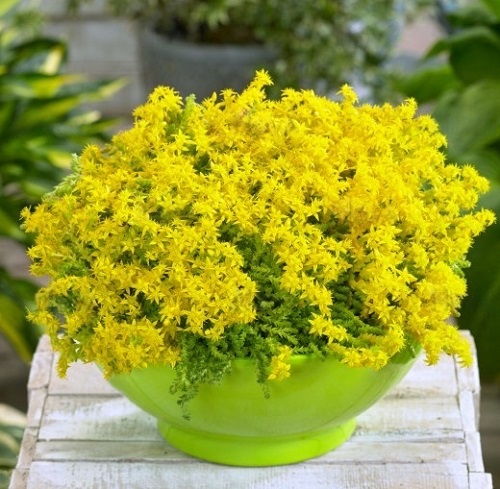










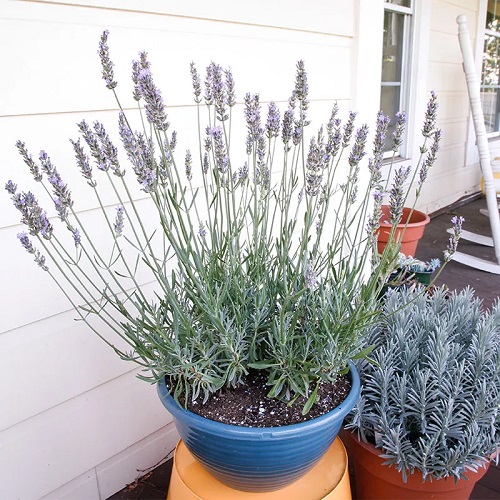




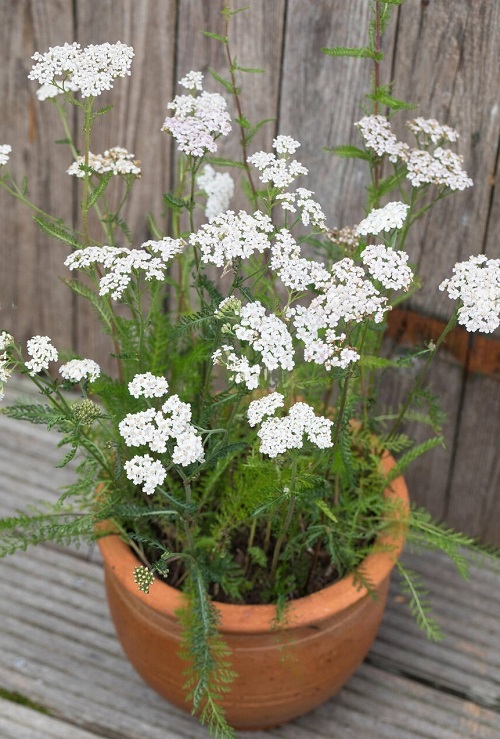







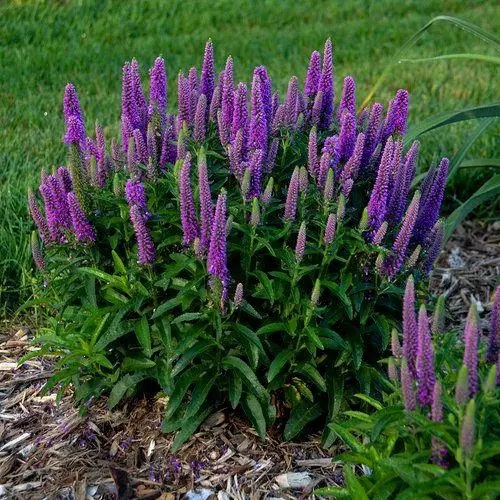








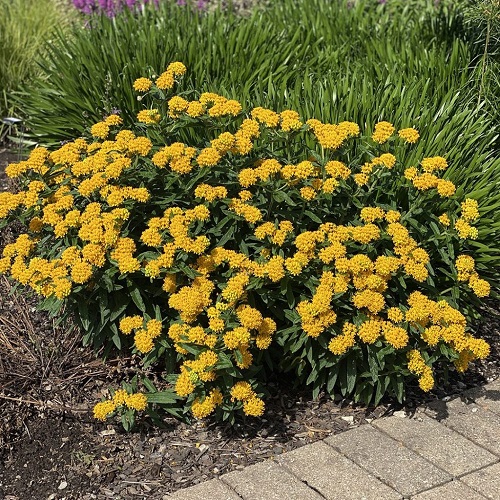

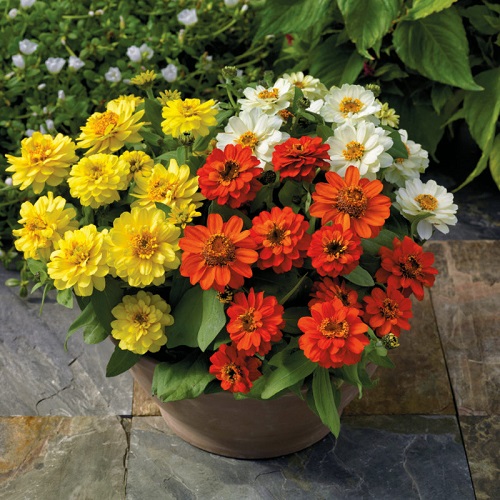
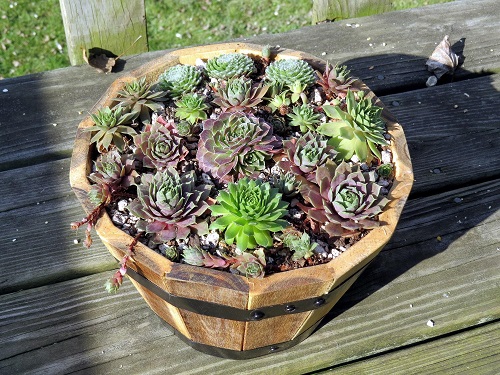

Please make sure to state that Oleanders are poisonous
No.
They are not
Plz put Venus flytrap
is the Venus Flytrap evn a Drought Tolerant Plant?
lol they are bog plants
Thanks. Great article
Many of these are tropicals and will not grow well in zone 7 or lower. They cannot survive winter. Lantana is great, but doesn’t smell very nice.
I liveon vancouver island and they grow just fine for me but they do act as perrenials and the seed pavks say annuals.
Right.
I think lantana smell yacky.
Thank you so much
Some newer varieties of lantana have better fragrance..except the “grape”!
Don’t let Lantana get away on you! Has turned into an environmental disaster in Australia 🙁
Lantana, although an introduced species actually provides a safe home or hideaway from birds for our smaller native rodents and marsupials. It was first introduced by a wealthy English family at Daisy Hill in QLD. I learnt about it on a year 12 biology/ecology field trip to the nature reserve there.
So informative
please advise how to grow Lantana in the same way as from the pot from this page ? thanks
Please advise on how to grow lavender from seeds.Tried various tips but not successful. Saplings not available in our place.
Lantana is also poisonous…just always wash hands don’t stick your fingers in your mouth..
Lantana is NOT poisonous. That is a myth perpetuated by a few folks. I have done a lot of research and the general consensus is that the plant is not poisonous. I have grown it for over 20 years and have never had a problem with it.
I have heard Lantana is dangerous to cows.
I hate flowers
They hate you too.
LOL! Thank you!
Oleanders clog sewer lines, also currently undergoing a blight in Arizona
Just add “pet-friendly” when applicable – the most beautiful garden isn’t worth losing a beloved pet!
Helpful, but not exactly what I’m looking for…I need to find plants that are good for Part shade/Part sun, and don’t need much watering, but most importantly, child friendly and pretty.
Salvias are a good choice, as well as lavender!
I just learn something new. Thank you
thanks . it will help me in my thesis studies.
Hi I have a caravan on solway firth, and have a few ceramic pots, which I would to put plants in but I am only there every 3 weeks. Is there any plants that would be suitable. In the winter I put pansies in and they were great. Thank you
I have grown Lantana several times and never knew it was poisonous..that is scary . I will research it more, thanks
There are a lot of plants who don’t require much water to survive like Succulents and you have mentioned some of them; Succulents come in lots of varieties (like slender cacti, spiky sedum, smooth Echeverri, or flowering Kalanchoe), but typically enjoy sunlight and dry air. Their thick leaves store water, so they typically only require weekly watering.
I live in SC, what do you advise me please? Thanks
Where can I buy these types of plants?????
Nana k
is the Venus Flytrap evn a Drought Tolerant Plant?
What kind of produce can be bought that is drought resistance in Phoenix AZ?
I have 2 large terracotta pots at my front door, I have one with impatiens in it. what other flowers can I plant in them, I know impatiens dont like sun so both pots are in shady areas, no sun at all so I kind of want something that will grow needing no sun but not too big wither.
Wild lilac species are fragrant and colorful shrubs. They re evergreen and drought tolerant, and they can be used in the landscape as screens, hedges, ground covers, borders, and more. While most wild lilac species are native to California, some grow in the eastern U.S., the Rocky Mountains, the Pacific Northwest, and Mexico. Some grow upright; some are compact and bushy; and some are low-growing and spreading.
cactus.
I have had Lantana in my butterfly garden for many years. Butterflies love lantana. The colorful, nectar-rich flowers that these plants and shrubs produce are called “butterfly magnets” by many garden centers and nurseries. Their bright colors, tight bunches of blossoms, and flat structure make lantana the perfect choice for any butterfly garden.